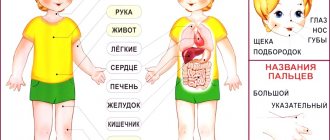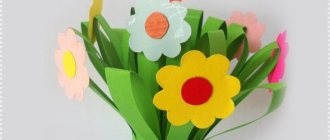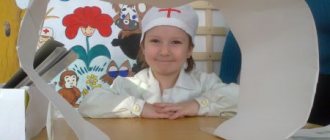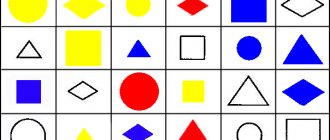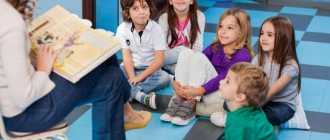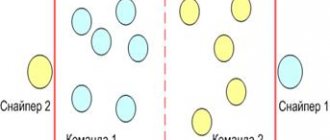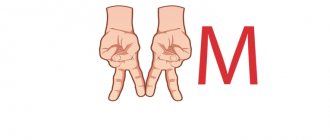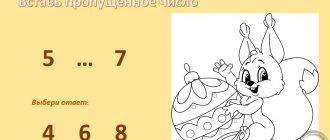Exercise “The fourth is extra” - name the extra one and explain your choice.
Swallow, wolf, hare, cat (an extra swallow, because it is a bird, and the rest are animals) Starling, dog, cuckoo, nightingale. Sparrow, dove, crane, tit. Rook, swan, duck, crow. “Who are there many in the forest?” There are many starlings in the forest (swallow, nightingale, stork, rook, crane, cuckoo, heron, swift) “Count to 5.” One swallow, two swallows, ...... five swallows. (cuckoo, starling, nightingale, stork, rook, crane, heron) “Name the chicks.” rook - rook... duck -... cuckoo -... starling -
Learn a poem about birds with your child. Do finger exercises with him. (when naming a bird, bend your fingers). A flock of birds Sing, sing, sing along, ten birds - a flock. This bird is a nightingale, this bird is a sparrow. This bird is an owl, a sleepy little head. This bird is a waxwing, this bird is a corncrake. This bird is a little gray feather. This one is a finch, this one is a swift, this one is a cheerful siskin. Well, this is an evil eagle. Birds, birds, go home! Clench your fingers into fists
Top
Tasks for the development of mathematical abilities
Developmental tasks for young preschoolers are not possible without mastering the basics of mathematics. Children should be given play activities to compare objects, for example, a Christmas tree is taller than a house, a rope is longer than a ribbon. In terms of quantity, you can offer your child a drawn train and ask him to paint the second carriage red, and the fifth one green. You can put wild animals in the red trailer, and a baby cow in the blue one, which is the third one. This way, the classes will be more interesting and will cover more than just mathematics.
You can start learning numbers from the age of 4
Logical problems like: “Sveta is taller than Seryozha, and Seryozha is taller than Lena” develop mathematical abilities well. Who's the tallest?
Developmental activities conducted with parents should take the form of a game, be interesting and fun. Then it will become a pleasant pastime not only for the kids, but also for their parents.
Assignment on the lexical topic: “Spring”
Learn a poem with your child. Do finger exercises with him.
Exercise "Spring"
Spring has arrived in the snow,
On a damp carpet. They walk with their fingers on the table.
Scattered snowdrops, Hands on the table, palms down.
I sowed grass. Spread - move fingers.
Now he is calling from all over. Arms are bent at the elbows - fingers are open.
Geese, swifts and storks Bend one finger on each hand.
Cuckoos and starlings.
Top
Visual memory development task
To develop visual memory, you need to prepare 10 pictures for the child, and they should be familiar to him. The objects depicted on them must be recognizable and clear. In addition, there should not be anything superfluous on them, for example, if a bench is depicted with a hare sitting on it, then the child can remember both the bench and the hare. During the lesson, the pictures should be laid out one by one, while naming them out loud, since he may mistake the pictured chair for a sofa. After all the images have been laid out, he needs to be given a minute to memorize.
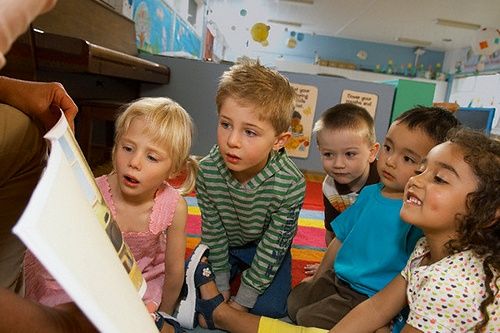
Visual memory activity - showing pictures and talking about them
If the child is confused or has named few words, then you can work with him in the same way with fewer images. For better memorization, it is recommended to connect words with each other in meaning and come up with a story with them.
Assignment on the lexical topic: “House plants”
Learn a poem with your child. Do finger exercises with him.
Take a quick look at the window: They bend their fingers in
Here we have geraniums blooming. fist, starting with the little finger.
And here is a handsome balsam,
Amaryllis next to him.
Fuchsia, begonia -
I remember all the names! Open your palm.
We will loosen the flowers, water them, Move their downward fingers.
Let them grow up day by day! Both palms are connected with a “bud”
raised above the head and opened like a flower.
“Call me kindly”:
Stem – ….., root – ……, flower – ……., leaf – ……, bud – ……..
“Choose words” for the names of indoor plants that you have at home (at least 3). For example: fuchsia - pink fuchsia is growing, beautiful fuchsia is blooming, delicate fuchsia is making you happy.
Select the signs (at least three signs): geranium (which one?) – ...
Select actions (at least three actions): geranium (what does it do?) – ...
Development of sound analysis skills.
Come up with (remember) 7-10 names of indoor plants, draw (or stick) them, print the first and last letter of their name.
Top
Copybooks for preschoolers - letters and numbers
All kinds of copybooks with capital letters and numbers from 1 to 10 are available for preschoolers. The methodological material allows you to develop your hand, fine motor skills, and train concentration and perseverance while performing tasks. To develop logical thinking in preschoolers, it is recommended to use material where numbers are found.
Russian alphabet with tasks

Open
Copybooks with numbers

Open
Recipes for children 5-6 years old
Develop beautiful handwriting in preschool children aged 5 to 6 years. It is advisable to prepare your child for school in advance, since it is at this age that they are easily trained and are able to easily learn something new. If you don't take care of this in advance, children will have a hard time in elementary school.
Capital letters from A to Z

Open
Mathematics copybooks

Open
Recipes for children 6-7 years old
For preschoolers from 6 to 7 years old, it is advisable to use math copybooks, as they will not only be able to develop their hands, but will also easily remember numbers.
Writing aids are also important. With their help, it will be easy to prepare your child for school or help him in first grade. Writing copybooks will not only teach you how to write the elements of letters correctly and at the right angle, but will also help the child learn to read already written capital letters, which often causes a problem at the initial stage of a young student’s education.
Copybooks by points
This type of educational materials has become especially popular today. The dotted recipes are designed for children 5-6 years old.
A child’s thinking at this age is not always capable of assimilating information that he needs to learn to write and count according to certain rules established by the education system. Such standard methods may not be perceived by the baby, so it is better to give preference to learning in the form of a game.
We trace the letters by dots

Open
We trace the figures by points

Open
Circle the numbers by dots

Open
Assignment on the lexical topic: “Professions”
Learn a poem with your child. Do finger exercises with him.
There are many noble professions,
Both useful and pleasant.
Cook, doctor, painter, teacher,
Seller, miner, builder...
I’m not naming everyone right away,
I suggest you continue.
Enrichment and activation of vocabulary. Ask your child to name at least 10 professions. Read him a few poems on the website page “Lexical topic “Professions” https://logopediy-dly-detey.ru/logopunkt/leksicheskie-temy/professii
Learn 2-3 riddles about professions. Work on the correct pronunciation of the given sounds and intonation expressiveness.
Work on the syllable structure of words and coordination of speech and movements.
Exercise “Show words with your hands” - cook, clown, shoemaker, fireman, traffic controller.
Development of sound and letter analysis skills.
Draw or stick 5-7 professions. Write short words in their entirety, and write the first and last letter of long ones.
For example: doctor – DOCTOR, salesperson – P________C
Top
Tasks for the development of phonemic hearing
An important step for Russian language classes will be developmental tasks aimed at phonemic hearing. First you need to teach your baby to clap words syllable by syllable. You need to start clapping words with 2 syllables, then 3, 4, and then 1 syllable. When dividing syllables, it is better to immediately introduce the baby to stressed and unstressed letters.
It is good for the development of phonemic hearing to connect a word with its corresponding diagram, the sounds in which are depicted in circles. Several words are written in a row, and opposite is a diagram with syllables. The child must find the necessary graphic image of the word. Moreover, the number of sounds in words should be different and the child should not be given words that have several sounds, such as fir-tree, yula, cabin boy. If the baby is not able to cope with the task, then you can first work out which sound is the first in the word and which is the last.
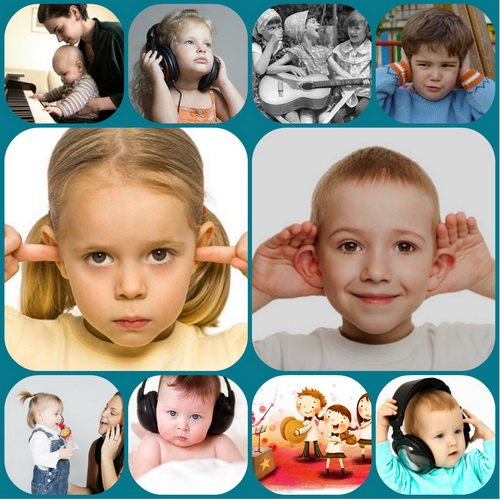
Phonemic lessons - you need to choose a methodology and use different types
The next step is to work on the vowels and consonants. Developmental tasks should be aimed at ensuring that vowels are sung, and consonants encounter an obstacle during pronunciation.
Assignment on the lexical topic: “Pisces”
Exercise “Little fish and giant fish.” Formation of word formation skills, the use of nouns with the suffixes -ish, -ishka:
gudgeon - gudgeon - gudgeon ruff - brush - ruff,
shark - sharks fish - fish - fish
crucian carp - crucian carp - crucian carp perch - perch - perch
Guess the riddles. Explain how you guessed what words helped you find the answers.
She lives in water.
There is no beak, but it pecks. (Fish)
It crawls the other way around - backwards. (Cancer)
She is the storm of the seas
Get away from her quickly! (Shark)
Development of sound and letter analysis skills.
Draw or stick 10 fish. Write short words in their entirety, and write the first and last letter of long ones.
For example: catfish - COM, flounder - K________A
Learn a poem with your child. Do finger exercises with him.
Fish
The fish swims in the water, the fish arches its back,
The fish have fun playing. I took a bread crumb.
Fish, fish, mischief, The fish waved its tail,
We want to catch you. The fish quickly swam away.
Top
Olga Naumova “Logic”
The ability to think logically and reason is necessary for a child to successfully study at school - otherwise he may face difficulties in mastering basic subjects. This manual contains exercises that will help a future first-grader master basic skills - recognize objects by given characteristics, compare and find common and distinctive features, generalize, determine patterns and sequence of events, and solve simple logical problems.
Download the book “Logic” by O. Naumov
Free online training
Home Preschool
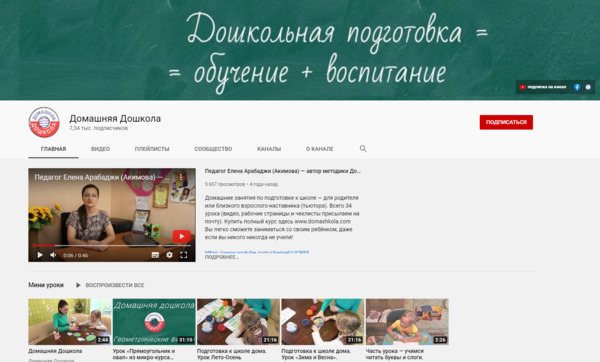
Website: home preschool
Some lessons from the paid full course, which are no longer available for purchase, have been published on the YouTube channel. A parent or other adult can teach the child using available videos.
The quality of recording or editing may not be ideal, but each lesson is filled with the minimum required for the subject, taking into account the characteristics of age. The possibility of using ordinary things as educational material is taken into account.
Masha and company
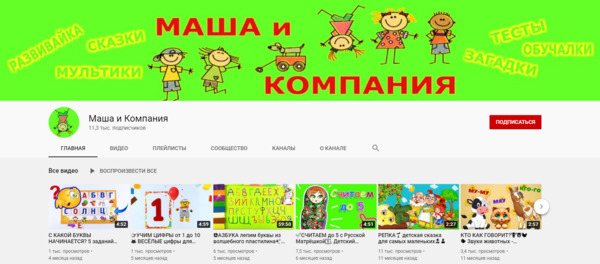
Website: Masha and company
Preparing for school online with the Masha and Company channel is carried out in many aspects. You can watch fairy tales with your child, make puzzles, play games and study using other educational videos.
For easy memorization and development of children, the author presents all material in a playful way.
Preparing for school is an important stage, which you can cope with together with professional teachers. At the same time, parents should also work with the child so that progress is constant.
